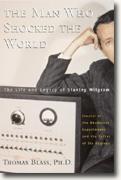Thomas Blass
book reviews:
· general fiction
· chick lit/romance
· sci-fi/fantasy
· graphic novels
· nonfiction
· audio books
· author interviews
· children's books @
curledupkids.com
· DVD reviews @
curledupdvd.com
newsletter
win books
buy online
links
home
for authors
& publishers
for reviewers

 |
The Man Who Shocked the World: The Life and Legacy of Stanley Milgram Thomas Blass Basic Books Hardcover 360 pages March 2004 |
|
"Just how far would a person go under the experimenter's orders? It was an incandescent moment..." Thus wrote Stanley Milgram, sometime in 1960, presaging the research he was to devise to study how ordinary people will react when pressured to hurt their fellow human beings.
Even though the person on whom pain was "inflicted" was an actor whose responses were carefully rehearsed, most people found the obedience experiments inherently repugnant. However, academics recognized the value of these groundbreaking efforts to explain human behavior. The experiments gave legitimacy to the assertion that those who knuckle under to tyranny are simply normal folk trying to cope in an unpleasant set of circumstances, not, as is sometimes imagined, innate sadists who enjoy torturing their neighbors. Milgram created a number of progressive behavioral game plans to analyze similar premises. How many people would make the effort to return a lost letter? Would people who had viewed a television program with marked anti-social content be more inclined than others to steal money from an unattended charity box? Less problematic is Milgram's "small world phenomenon," which came to be known as "six degrees of separation." He assigned students to locate a person in another city, someone with whom they had no known connection, and to do so by establishing a chain of most likely associates. This established the pattern: between a seeker and the object found, there were an average of six intermediaries. This fascinating concept, no less than Milgram's less cheerful experimentation, became the focus of dramatic productions and eventually entered common parlance. Milgram's genius for analyzing and codifying human foibles will not appeal to everyone, though this is an important book. It makes a sympathetic sweep through the life of this remarkable man, whose work influenced much that came after. Thomas Blass, social psychologist and unchallenged expert on Milgram's life, asserts that "the obedience experiments have had an intellectual impact far beyond their home territory." The flaw in Milgram's obedience researches was the powerful sense of realism that pervaded the clinical situation, making an objective result all but unattainable, though not detracting from the innate truth of his basic premise. Milgram was considered "playful," and was admired and appreciated by his students for stimulating and encouraging their creative efforts. One day he communicated only in song, responding only to those who sang back. He loved to contemplate such frivolous matters as what the average New Yorker really thinks about the clouds of steam that arise from gratings in the sidewalk. He died at age fifty-one, of a heart attack, joking to the last about getting a heart transplant - from a baboon. © 2004 by Barbara Bamberger Scott for Curled Up With a Good Book |
|
|
|
 Click here to learn more about this month's sponsor! |
|
| fiction · sf/f · comic books · nonfiction · audio newsletter · free book contest · buy books online review index · links · · authors & publishers reviewers |
|
| site by ELBO Computing Resources, Inc. | |
 Born in 1933 to Jewish immigrants, Milgram was convinced that "my spiritual home is Central Europe." A social psychologist, he was powerfully influenced by the legacy of the Holocaust and the compelling notion that, to please an authority figure, even a good person will cooperate in hurting other good people. He devised a series of experiments using an apparent electric shock inflicted on a confederate by an obedient subject. His research provoked the New York Times to blare: "Sixty-five Percent in Test Blindly Obey Order to Inflict Pain." Lauded by some colleagues as readable, vivid and meritorious, Milgram's research was also, naturally, condemned utterly by others, notably Bruno Bettlelheim, who compared it to "the human experiments of the Nazis."
Born in 1933 to Jewish immigrants, Milgram was convinced that "my spiritual home is Central Europe." A social psychologist, he was powerfully influenced by the legacy of the Holocaust and the compelling notion that, to please an authority figure, even a good person will cooperate in hurting other good people. He devised a series of experiments using an apparent electric shock inflicted on a confederate by an obedient subject. His research provoked the New York Times to blare: "Sixty-five Percent in Test Blindly Obey Order to Inflict Pain." Lauded by some colleagues as readable, vivid and meritorious, Milgram's research was also, naturally, condemned utterly by others, notably Bruno Bettlelheim, who compared it to "the human experiments of the Nazis."